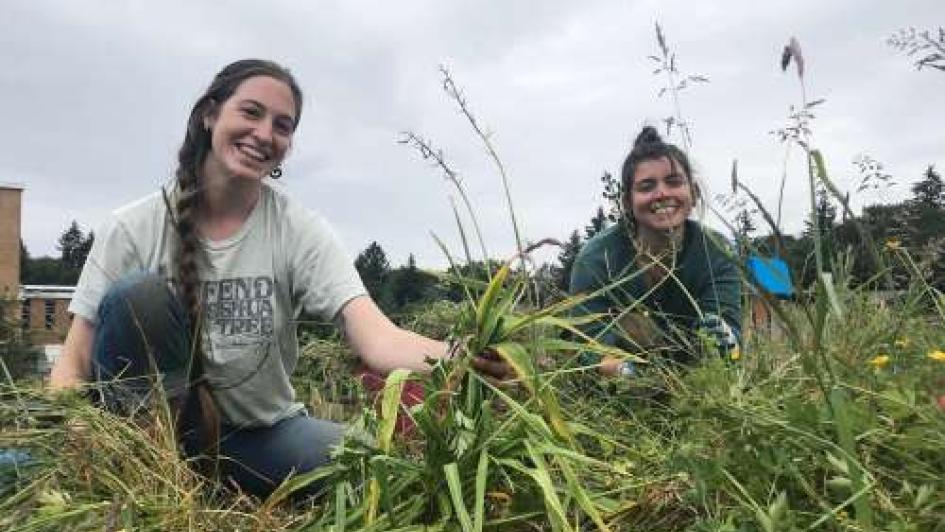Funding Granted for Bastyr's Sacred Seeds Project

Published
In spring 2018, Bastyr University’s Medicinal Herb Garden was awarded two grants totaling $2,500 to support the final stage of the Sacred Seeds Ethnobotanical Trail Project.
A grant of $2,000 from the Tulalip Tribes and $500 from Washington Native Plant Society’s Central Puget Sound Chapter will go toward the final stage of the Sacred Seeds project: building community and learning opportunities around the Trail. The outcome will be increased awareness and understanding of the ecological importance and medicinal uses of the region’s indigenous plant species by community members. Funds will be used to create outreach materials, develop a K-12 curriculum, support forest canopy regrowth, and reduce barriers to accessing the Sacred Seeds Trail.
At the root of Bastyr University’s natural medicine education is the extensive Medicinal Herb Garden on the Kenmore, Wash., campus. For over 20 years, these gardens have served as outdoor classrooms for students and the greater community — a place where people can connect with and learn firsthand about the healing powers of the natural world surrounding them. The Medicinal Garden on campus is devoted to providing a safe space for exploration, learning and reconnection with the natural world in ways that honor the cultural traditions and heritage behind every plant.
The Sacred Seeds Ethnobotanical Trail is part of an international network of gardens containing native plants with medicinal, ceremonial, edible, and craft significance. Begun in 2011 and spanning approximately one mile through meadows and forests, this Trail comprises the largest part of Bastyr’s Medicinal Herb Garden on campus. It is the very first garden dedicated to cultivating healing plants of the Pacific Northwest and the Salish Sea bioregion. The Bastyr Garden also includes a new Teaching Greenhouse, constructed in June 2017. On a regional scale, the project is a collaborative effort with local tribal communities and K-12 schools to increase awareness and understanding of Pacific Northwest (PNW) native plants and to offer a central location that tribal nations can use for sharing their plant traditions within their communities.
Tulalip Tribes and Washington Native Plant Society have generously supported the Sacred Seeds Project in its years of growth. Bastyr University is grateful for their continued support as we step into this third and final phase of the Trail project.
Oxbow's Native Plant Nursery manager, Bridget McNassar, shares her appreciation for Bastyr’s work on this Trail project: “I highly recommend the University for its exemplary work and firmly believe in its ability to achieve the proposed project to restore the Sacred Seeds forest canopy and understory.”
Phase 3 of this project will be directed by Bastyr’s team of botanical experts: Sheila Kingsbury, ND, Chair of the Botanical Medicine Department, and Katie Vincent, Botanical Garden Supervisor.
About Bastyr:
Bastyr University is a nonprofit, private university offering doctoral, graduate, and undergraduate degrees, with a multidisciplinary curriculum in science-based natural medicine. Recognized globally for its rigorous curriculum and strong research, the 40-year-old University has campuses in Kenmore, Washington, and San Diego, California. Bastyr's international faculty educate future leaders in the natural health arts and sciences, with an emphasis on integrating mind, body, spirit, and nature.
About the Tulalip Tribes:
The Tulalip (pronounced Tuh’-lay-lup) Tribes are successors in interest to the Snohomish, Snoqualmie, Skykomish, and other allied tribes and bands signatory to the 1855 Treaty of Point Elliott. Their tribal population is over 4,800 and growing, with 2,600 members residing on the 22,000-acre Tulalip Indian Reservation located north of Everett and the Snohomish River and west of Marysville, Washington. The Reservation is rich with natural resources: marine waters, tidelands, freshwater creeks and lakes, wetlands, forests and developable land.
About the Washington Native Plant Society:
The mission of the Washington Native Plant Society is to promote the appreciation and conservation of Washington’s native plants and their habitats through study, education, and advocacy. The Puget Sound Chapter serves King County and the southern half of Snohomish County, encompassing native forests, alpine areas, wetlands, coastal areas, streams and a booming population.

